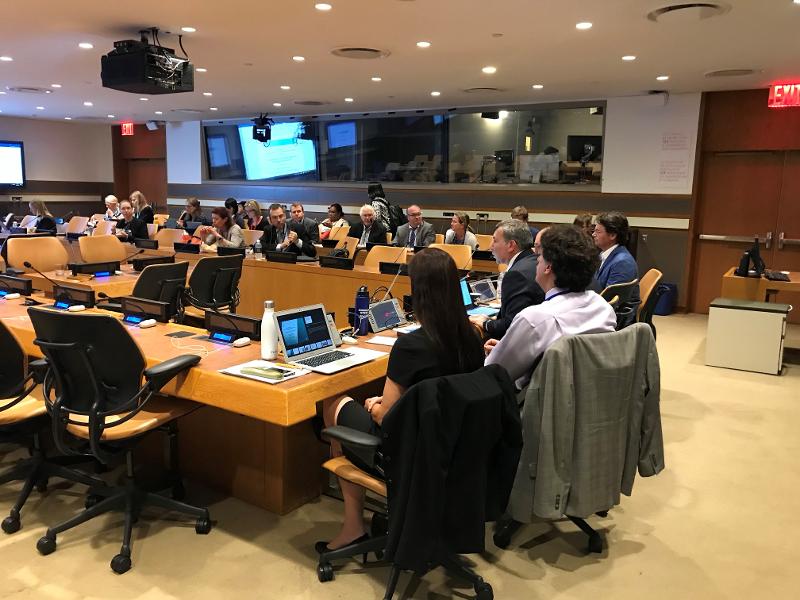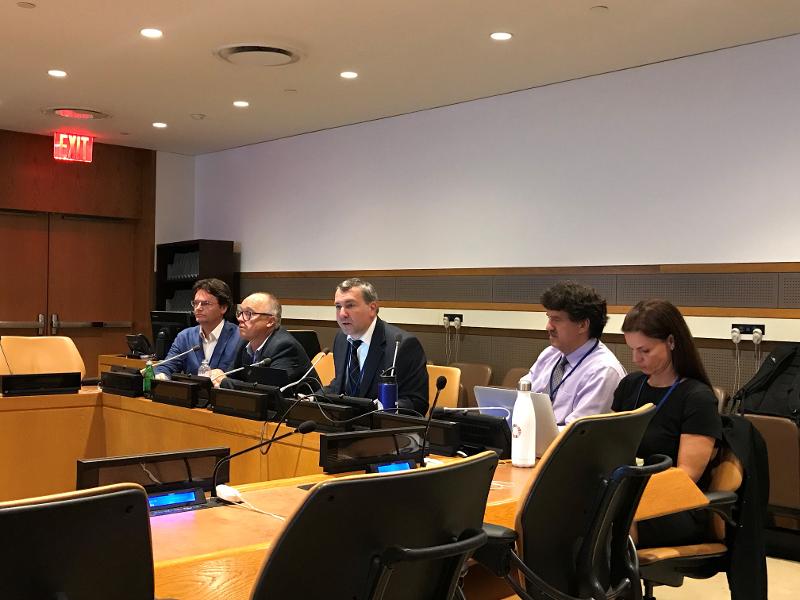Report from JCLOS' side event to the first UN negotiating session towards a new agreement on marine biodiversity in areas beyond national jurisdiction
Read the report of Postdoctor Fellow, Vito De Lucia, who chaired the Side Event.

JCLOS organized Side Event to the 1st session of the BBNJ negotiation to discuss implications of a future BBNJ agreement for Arctic Biodiversity Governance
The first substantive session of the intergovernmental conference (IGC-1) aimed at adopting a new global treaty on marine biodiversity in areas beyond national jurisdiction (BBNJ) took place on September 4-17, 2018. IGC-1 was an important step in a process that started over a decade ago. However, the formal diplomatic conference was only recently launched by the UN General Assembly, with a resolution adopted on 24 December, 24 2017.

There are four items in the negotiating package: area-based management tools, including marine protected areas; marine genetic resources, including the sharing of benefits; environmental impact assessments; and capacity building and technological transfer. Additionally, there are a number of cross-cutting issues, such as, importantly, what institutional arrangements the new treaty should create, and how would these interact with existing bodies and institutions, especially those with regional or sectoral competence.
The K. G. Jebsen Center for the Law of the Sea (JCLOS) organized, together with the Fridtjof Nansen Institute (FNI), a side event on the implications of a future treaty for Arctic biodiversity governance. The event, which took place on Wednesday, September 12 (see list of side events at the UN BBNJ website for details), was part of a project led by Dr. Vito De Lucia and funded by the FRAM Centre (High North Research Center for Climate and the Environment) and the Norwegian Polar Institute, and was titled
The relevance of the event for the IGC-1 lies in the fact that a large part of the Central Arctic Ocean is located beyond national jurisdiction, and for this reason any global institutions that the new treaty will create may have to interact, and respect the mandates and competences of, existing bodies that operate in the Arctic. This JCLOS/FNI side event aimed thus at exploring a number of questions related to the possible interactions between the complex Arctic marine governance regime with the future treaty.
Speakers included Ms Kristine Dalaker Kraabel (JCLOS), Mr Christian Prip (FNI), Prof. Raul Primicerio (BFE/UiT) and Ambassador David Balton, now a fellow at the Wilson Center, but until recently involved directly with negotiations of a number of treaties concluded under the aegis of the Arctic Council, including the recent agreement on Central Arctic Ocean fisheries, to be formally signed in Greenland next month. The event was chaired by Dr. Vito De Lucia (JCLOS).

Each speaker discussed the possible implications for an effective Arctic marine biodiversity governance of a new global legal regime for BBNJ through the lens of cooperation and compatibility, including, importantly as it turned out, the potential role of the Arctic Council within a new global institutional framework. Questions that were addressed included scientific aspects related to the ongoing changes to the unique and vulnerable Arctic ecology and environment, and their potential implications for an ecosystem approach to Arctic biodiversity governance; the Central Arctic Ocean Fisheries Agreement and what it may mean for BBNJ and other regional initiatives governing fisheries; the institutional arrangements in the Arctic, exploring how regional institutional arrangements may be incorporated into the overall legal and institutional setup of a new regime for BBNJ; whether regime interplay and complexity provides an obstacle or an opportunity for the anticipated global treaty, with specific focus being given to the roles of the various stewards of the Arctic Ocean.
The side event drew a large audience, including policy-makers, delegates, academics and representatives of governments and NGOs, and there was an engaged and lively debate both during Q&A and in small groups afterwards.
Last updated: 09.10.2018 14:05